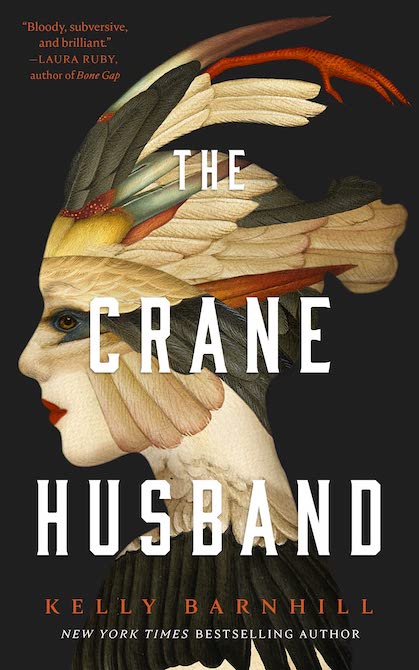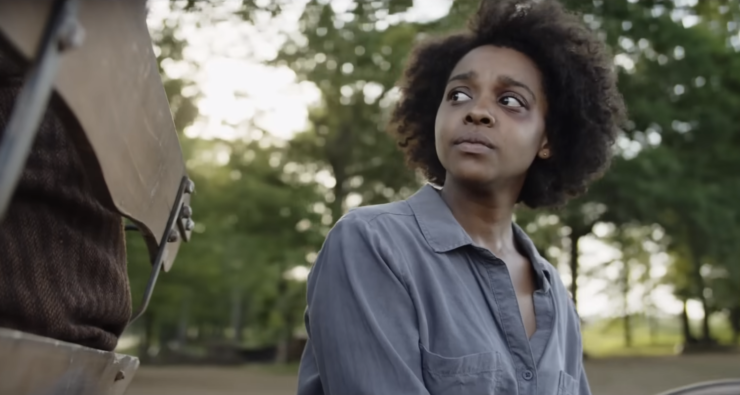Hollywood likes making slavery and Jim Crow pictures. Sometimes we get a staggering piece of storytelling that changes the conversation or sheds new light, but all too often these movies and TV shows revel in the exploitation of torture and dehumanization of our ancestors, as if they’re shot for white audiences rather than us. These stories aren’t about us as people but us as historical events.
If Kindred had been just some random time travel slavery show, I might not have even bothered. But because it was based on an Octavia E. Butler novel I couldn’t not watch. The novel the show is based on, Kindred, was published in 1979, and I’ve read it a few times over the years. It’s a quick read, but one that sticks with you. It asks some hard questions and doesn’t offer easy answers. Kindred the TV show does a decent job adapting and updating Butler’s novel, but that’s about it. It’s not exploitive, I’ll give it that.
Dana (Mallori Johnson) is a young woman newly arrived in LA. She’s flush with cash after having sold her grandmother’s Brooklyn brownstone and is eager to break into television writing. As soon as she moves into her new house, she’s sucked back in time to save the life of Rufus Weylin (David Alexander Kaplan), the son of drunk plantation master Tom (Ryan Kwanten) and his equally toxic wife Margaret (Gayle Rankin). During one of those trips to the past, she accidentally pulls along Kevin (Micah Stock), an affable waiter she hooked up with who struggles with demons of his own. In the present, her white neighbors go from nosy to full-fledged Karens by spreading dangerous rumors about their new Black neighbor and calling the cops under the pretense of being concerned about Dana’s wellbeing. Her aunt and uncle, a nurse and an ex-cop, think Dana’s increasingly erratic behavior may send her down the same path as her supposedly mentally unstable mother, who died in a tragic car accident years before. Except she didn’t. She was also pulled into the past, but unlike Dana she can’t figure out how to return.
Buy the Book


The Crane Husband
It quickly becomes apparent that Rufus is the reason Dana keeps getting yanked back. He’s her ancestor, and it’s her job to keep him alive long enough to reproduce. As Dana sees first hand the horrors of slavery in the past and anti-Blackness in the present, she struggles to balance the realities of antebellum Maryland and her mandate. Add to that the enormous difficulty in being a modern day twentysomething Black woman sent back to an early 19th century plantation. There is so much to explore in a TV show like this. Too bad Kindred barely scratches the surface.
The novel delves into a lot despite its fairly straightforward plot. The complexity is in the subtext and the themes, such as the large and small acts of resistance, the lengths people go to survive, how anti-Blackness is built into the fabric of American society, the ways enslaved people maintained some semblance of agency in a world designed to strip them of it, and the “pick the best of bad options”-type choices enslaved and free Black people made (and still make). In the novel, Dana is the character around which everyone else orbits. In the show, everyone orbits around Tom in the past while in the present Dana is constantly pulled into the gravity wells of other people, like her white neighbors and her aunt. Because the show spends so much time away from Dana and the enslaved Africans on the Weylin plantation, we don’t explore those themes very deeply, but I hope we’ll get into them more as the series progresses.
Which leads me to the show’s biggest issue: that it was written as an ongoing series. It has a killer cliffhanger that had me shouting at the screen, but it doesn’t feel like a complete season. It was just eight or so hours of television. This either needed to be a self-contained season or a miniseries, and frankly I would’ve preferred the latter. There simply isn’t enough plot in the book for multiple seasons. That is why writers Matthew Shire and Branden Jacobs-Jenkins added in the stuff with Dana’s relatives, Kevin’s family, the racist neighbors, and the mess between Sarah and Winnie. Most of it felt at best like padding, at worst a way to bring in a white audience by shifting the focus off Dana and onto other white characters. I get the point of the present-day scenes—they act as parallels to what is happening in the past—but they also feel largely unnecessary in the grand scheme of things.
What they left out is as noticeable as what they added in. Dana from the book interacts with enough enslaved people that the reader understands her place on the Weylin plantation and what others think of her. Here, Dana floats from house to house: hers, her aunt’s, Kevin’s, her mother’s, Tom’s. She does almost no work, engages with few enslaved people in meaningful ways, and has little interest in the lives of anyone else. It’s going to be a long haul to get the show’s version of Dana where she needs to be psychologically in order for the plot to resolve itself satisfactorily. The Dana of the book grappled with how easy it was for her to settle into a life built around slavery, but this Dana is either unwilling or unable to. She doesn’t consider asking the other Black people what they want or need, nor does she pause to consider how her actions will impact them. She has the freedom to leave, but the Black people in the past are stuck dealing with the consequences of her poorly thought out choices.
Many of the choices the show makes in deviation from the book make sense given the medium, the context, and what’s happened in the world since the 1970s. However, some of the choices are befuddling or frustrating. The trip to town is about as subtle as a bull in a china shop in terms of getting its point across. A character crucial to the entire story is sidelined to the point where they have only a handful of lines the entire season. Another character is turned into an outright villain (no, it’s not who you think it is) while another is little more than a personality-free plot device. The way those characters’ subplot unfolds, it seems more than anything like the writers misunderstood those parts of the book.
Last year’s The Underground Railroad did a stunning job adapting another brilliant speculative fiction novel about slavery without resorting to Black trauma or centering whiteness. Kindred is at times powerful, immersive television. Mallori Johnson is a tremendous actor who manages to get a lot of depth into a character who is given surprisingly little to do in a show where she is ostensibly the main character. Overall, however, the narrative and structural choices hold the show back from greatness.
Alex Brown is a Hugo-nominated and Ignyte award-winning critic who writes about speculative fiction, librarianship, and Black history. Find them on twitter (@QueenOfRats), instagram (@bookjockeyalex), and their blog (bookjockeyalex.com).










